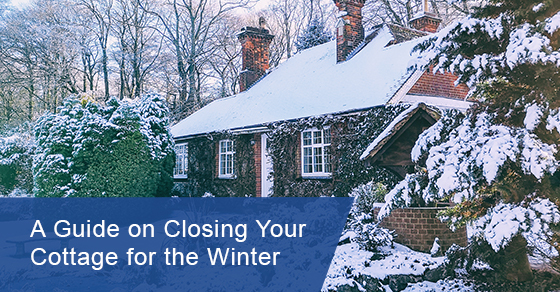A Guide on Closing Your Cottage for the Winter
It’s always a bittersweet time when summer winds down. Although the fall colours of Ontario are stunning, knowing your days at the cottage are numbered can make enjoying their beauty a little tough. While the winter brings its own reasons to celebrate, it also means you’ll need to make plans to shut your cottage down until spring. Here, we offer an easy guide for closing your cottage for the winter.
Wrap Your Pipes With Foam
Even winterized cottages need protection against the dropping temperatures that can freeze pipes. Although your walls are well insulated, being away for longer periods of time without the heat on can lead to freezing. As well, many winterized cottages have areas such as crawlspaces, attics, garages, and non-insulated walls with pipes running through them. Check all of these areas for pipes and then wrap the pipes in insulating foam. This will provide enough protection against the cold. For cottages not winterized, the job gets a little harder. You’ll need to locate all your pipes and wrap them in foam.
Turn Off the Main Water Supply
Find your main water supply and turn it off. Then, go to each faucet in the cottage and run the water to drain out any water remaining in the pipes. You should also flush the toilets until the tank is empty. If you skip this step, the water left in the pipes and toilet can freeze and burst.
Adjust the Heat
You have two choices for your furnace when closing your cottage down over the winter. The first is to shut the furnace off completely. The second is to set it to the lowest temperature or about 10°C to help reduce risk for frost build-up. The first option completely saves energy, while the second at least reduces consumption while offering some protection for your cottage. If you have space heaters, then the power has to be shut down at the main power panel.
Shut Off Gas and Water Heater
If your cottage uses a gas source, then be sure to turn it off safely. Your water heater will also have to be shut off. If you aren’t sure how to shut off the gas, you might want to call your gas company for assistance. It can be dangerous to do this incorrectly.
Unplug Major Appliances
Major appliances include your stove/oven, fridge, washer/dryer, and dishwasher. You might be tempted to shut down your power completely, but this will interfere with the operation of your sump pump, security system, and outdoor lighting that you’ll need to be left on. Instead, just unplug everything. If you have things like electronics and lamps, you can unplug these as well.
Arrange a Septic Tank Service Call
Although most septic tanks are scheduled for service calls every five to eight years, you should consider having it checked before you shut down for the winter. This will avoid possible issues that can make your return to the cottage in the spring unpleasant. You can arrange for a checkup and cleaning, so any issues are discovered and repaired before you leave for the winter.
Inspect the Exterior
Inspect the entire exterior perimeter of your cottage and any outbuildings such as bunkies. Look for possible openings where local wildlife might make a new home for the winter. Also, look for signs of damage to your chimney, eavestroughs, and roof. Any issues should be dealt with before winter sets in or else you could be faced with serious water damage. You want your roof to stand up to the cold Ontario winter, so repairs should be made in the fall. This includes making sure the eavestroughs are clear to avoid ice dams. Check the windows and doors to make sure they are sealed and secure to reduce risk for water seepage, not to mention break-ins.
Check the Sump Pump
Your sump pump helps avoid flooding at your cottage. Therefore, you’ll want to have it checked to make sure it is operating properly. That is also why you’ll want to avoid completely shutting down your power. It’s a good idea to consider installing a sump pump with a battery backup. This way, should the power go out due to a winter storm, your sump pump will keep working. You can also look into sump pumps with wireless smart alarms that will send you a notice if it should shut down. Some cottage owners have a generator backup for their sump pump that kicks in when there’s a power outage. Having a backup plan for your sump pump can be one of the best decisions you ever make. It will reduce risk for flooding, while offering peace of mind.
Clean Stoves, Fireplaces, and Barbecues
Both wood-burning and propane stoves, fireplaces, and barbecues should be cleaned thoroughly. Propane tanks need to be disconnected from barbecues and stored safely, not in the cottage. You should also clean the barbecue to remove food residue that can attract pests. Be sure to cover the barbecue if you don’t have a shelter to store it. Wood-burning stoves and fireplaces should be ash-free, and moving parts should be oiled. Close the damper vent, and consider having your chimney and fireplace inspected to look for issues such as soot buildup and damage. This way, repairs can be made so you’re ready next year without worry of
fires.
Take Away All Food
Even if you have a freezer, all food should be removed from your cottage. First, it will reduce risk for rodents, and second, if there is a power outage, you won’t be at risk of food rotting in the fridge or freezer.
Take Home Valuables
While this can be a bit of a pain, consider taking home any valuables such as electronics, even if you won’t use them at
home. This reduces temptation for prowlers looking for something to steal while owners are away. Closing up the cottage might take some time, but it’s worth it to protect it from the harsh winters. Even if you think you’ve done everything, check one last time before you leave. The
seasonal insurance that many Ottawa cottage owners have will also offer more peace of mind. For more information,
speak to our team at Oegema, Nicholson & Associates Insurance Brokers today.


